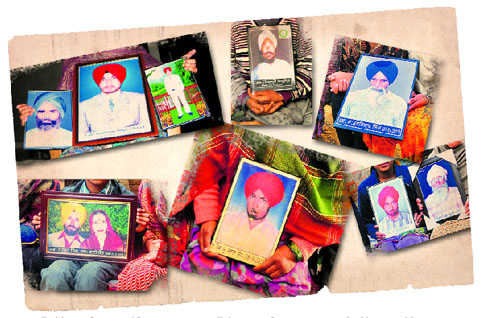
Kuljit Bains
Tribune News Service
Chandigarh, January 31
The Tribune has just done a series of reports on farmers in Punjab who ended their lives under the most exceptional and tragic circumstances. Even at the mere story level, these reports would turn the guts of the most sceptical of readers.
The reactions to the series, besides the generous offers of help from both abroad and home, have been varied: reckless farmers are themselves to blame; the government must go; journalists looking for melodrama to sell their wares; the typical NRI despair of ‘What’s becoming of my Punjab!’. But the strongest sense has been that people want things to change, even if they don’t know what and how.
A report is just a report. The meanings that a reader draws depend on what’s uppermost on his mind. That is the purpose this series serves — it is a trigger for thought in all quarters, government, scientific, academic, political, farmers themselves, and the ‘public’.
The tragedies reported were not common. But these exceptions, if read in one go, bring out certain patterns that explain the multiple crises on Punjab’s farms. There are commonly peddled arguments about farmers spending lavishly on social functions such as weddings, taking loans irresponsibly, drinking, or not being open to education. These may be all valid, but in no way explain the vast majority of cases, as seen in The Tribune reports. Even if it were true, then these issues too need to be addressed. The point is there are people dying, and thousands others who don’t consider their life worth living.
The stories brought out a reality, which here has been more incredible than what the most melodramatic of fiction writers would dare. What would you say of a woman married and widowed twice and losing two grown-up sons?
There are certain common threads that emerge. In the majority of cases, unavoidable accidents or disease amidst ongoing financial crisis preceded suicides. All were poor with very small landholdings, mostly under 3 acres. The education level in families was low; therefore, no alternative jobs. The loans were inflexible.
The amorphous sounding ‘agricultural crisis’ has to be tackled at two levels in Punjab — farmer and the agro-economy. The two are interlinked, yet need to be addressed with separate strategies focused on two goals — preventing suicides, and increasing incomes from agriculture. One needs an immediate crisis mode, the other long-term planning and action.
A suicide is the result of a certain circumstance, mixed with emotions, social expectations, and an individual’s psyche. All government machinery is limited to addressing the circumstances, though it has failed miserably even in that. Beyond that, the village community and farmer unions have to take charge, but have failed equally.
The cooperative initiatives have failed in Punjab. Farmer leaders have focused on demonstrations, demanding only compensations or higher prices. Never has a demand been raised for any change in what farmers grow, modern markets, bypassing of the middle-man, or greater funding for agricultural research. The truth is that leaders of all variety, political or farming, look for leadership opportunity in the immediate context. There is a vested interest in status quo.
Farmer unions need to structure themselves so that they can identify families in distress, that need exceptional and immediate help, and then pursue their cases. Arrange psychiatric counselling for families that have seen a suicide, as often one suicide is followed by another.
The reports show suicides are happening in families that are surviving hand to mouth, and have no scope to absorb the slightest of setbacks, such as expense on disease or death in an accident. This is where lack of governance and flawed public spending is shown up. The public health system is rarely useful for anything more than common ailments. The cancer treatment reimbursement scheme has been a failure.
The army of bureaucrats and bank officials fails to spot cases that have fallen through the cracks, the desperate ones. There are provisions for reconciliation and loan restructuring, but these often get exploited to favour the undeserving.
The Deputy Commissioners have powers and funds that can be used for intervention in specific cases. But these families have to be identified first. There is a whole chain of revenue officials which should be able to do that. If newspapers can identify people in distress, why can’t the bureaucracy? The question is of priorities, as set by the political leadership.
Quality free education is not available in villages, so farmers’ children are unable to find alternative vocations.
That there is a vested interest in maintaining status quo in the larger agro-economy of the state is also evident from the same lack of interest. What the various solutions or options for improvement might be are frequently discussed in newspaper columns, seminars, government’s own universities and departments. No action, however, can be shown to flow from all that thought.
The landholdings of marginal farmers are so small that even if their income were to double, it would not ensure their survival. The need is for a complete new revolution, on the lines of Israel. The profits from a given unit of land have to increase multifold. No small farmer can manage to achieve that on his own. An entire ecosystem has to be created.
So where can the push come from? The farmers — the single largest workforce — need to stand up for themselves, and demand something more than just free power or higher MSP. Insist on education, health, and a way out of the economically unviable wheat and paddy. The political system, for all its flaws, responds to the popular demand.



























